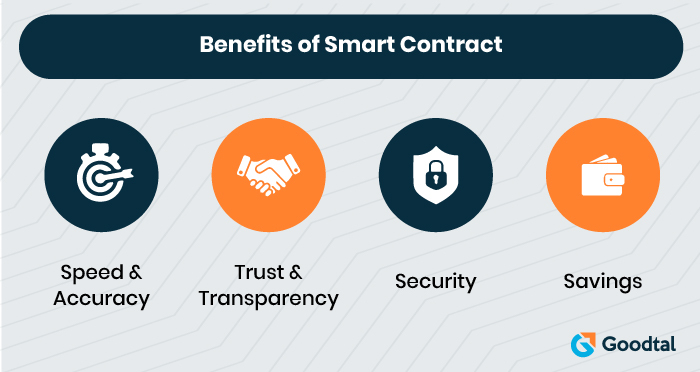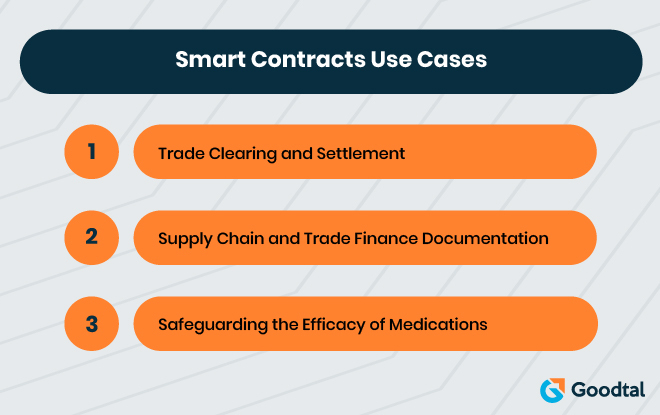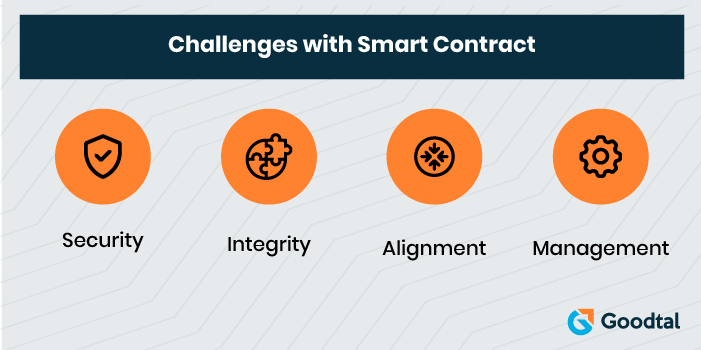
Blockchain has become the buzzword these days, and everyone is trying to figure out how to use the technology to their advantage. Blockchain can be used in several ways to develop software with applications in diverse industries.
As the name suggests, Blockchain consists of a chain of blocks that have data stored on them. If a change needs to be made in one of the blocks, all the previous blocks must be altered. The data is not stored on one server but on different servers across the globe. As a result, the technology is much more secure than other technologies, which are currently used to develop computer systems for firms that rely on software to run their business.
A smart contract is an application of Blockchain technology used to record events that are technologically and legally relevant and important for a firm. The significant advantage of a Smart Contract is that it rules out the possibility of fraud or mistakes, which can be committed by intermediaries or third parties who may record the event manually. However, a Smart Contract is not legally enforceable and binding by law.
How Smart Contracts Function
Smart Contracts work using conditional statements, which include "if/when…then..." scenarios. This basically means that when certain conditions are met, some actions have to be taken. For example, on fulfilling a requirement, funds will be released, or a vehicle will be registered. Thus, when the transaction is completed, the Blockchain will be updated, and it can only be seen by parties who have permission to do so.
Benefits of Smart Contract

Speed & Accuracy
As Smart Contracts rely on automation and computer code, which execute once a specific condition is met, no time is wasted on paperwork. Manual errors are eliminated, and thus, both speed and accuracy are optimum.
Trust & Transparency
As no third party plays any role in executing the contract, trust and transparency can be guaranteed. All the stakeholders receive a copy of the transaction, which cannot be altered, thus ensuring fair play.
Security
Transactions on Blockchain are encrypted, making it difficult for hackers to steal information. Blockchain consists of a distributed ledger, with data stored in each block connected to other blocks. Hackers will have to alter data in every block to change the information.
Savings
Smart contracts eliminate manual paperwork, which costs money in terms of payments and salaries. Technology does all the work, which is comparatively cheaper than employing a workforce over time.
Smart Contracts Use Cases

Let's discuss some of the real-world examples of Smart Contracts being used. Although several use cases exist, we examine the three most prominent ones.
Trade Clearing and Settlement
Blockchain provides an automated single ledger, so financial transactions are executed when certain conditions are met. This reduces lag in workflows and eliminates errors that will creep in if transactions are executed manually. Trade Clearing and Settlement require several approvals and internal/external reconciliations.
Although Banks maintain substantial IT networks, independent processing by each entity results in procedural delays and expensive settlements. With Blockchain and smart contracts, there is a lot of scope to streamline clearing & settlement processes.
Supply Chain and Trade Finance Documentation
Smart contracts can streamline many processes by using Blockchain, which will bring records stored on different databases into a single shared ledger. Supply chains rely on paper-based systems, where documents like Letters of Credit and Bills of Lading must be verified and signed by multiple parties to be processed.
Even digital technology has not addressed this issue, as computer networks track the logistics of these papers. Smart contracts can enable the automation of the supply chain and the release of funds when specific tasks are completed. Currently, $18 trillion is being processed yearly in transactions by paper-based systems, which creates enormous potential for smart contracts.
Safeguarding the Efficacy of Medications
Pharma Portal, powered by IBM Blockchain Transparent Supply, is a platform that tracks temperature-controlled pharmaceuticals across the supply chain to provide accurate and reliable data to various parties.
Challenges with Smart Contracts

Security
The smart contract involves multiple parties and confidential information. If this information is leaked or hacked, it can result in security issues for all stakeholders. The technology is new, and hackers identify loopholes in the system and take advantage of them to steal information. Ethereum, a blockchain platform with a Smart Contract feature, lost $50 million in cryptocurrency to hackers in its early days.
Integrity
One Oracle is a streaming data source that sends event updates. This platform needs protection from hackers who can fake events to execute smart contracts. The platforms must be programmed accurately to execute smart contracts in case of complex events.
Alignment
Although a Smart Contract aligns many different parties and accesses data stored from various sources, it saves a lot of time and effort. However, preventing things from spiralling out of control in case of an unintended event will be tough. This issue poses challenges to scalability and manageability.
Management
It is complicated to change a smart contract, as a minor change would require a completely new one. This can be considered a security advantage, but due to this limitation, it will be impossible to make changes or add new conditions to the Smart Contract.
Ethereum
Ethereum is an open-source blockchain platform that has smart contract functionality. A Canadian/Russian programmer, Vitalik Buterin, wrote a research paper on which Ethereum is based. Ethereum is a non-hierarchical network of computers that builds on an ever-growing series of blocks called the Blockchain. Ether is the cryptocurrency on the platform, which is second only to Bitcoin in overall market capitalization.
Ethereum Virtual Machine(EVM) shows the run-time environment of transaction execution in Ethereum. EVM maintains a stack or balance of all accounts. The formal definition of EVM is mentioned in the Ethereum Yellow Paper. EVMs are written in C#, Go, C++, Haskell, Rust, Ruby, Python, Erlang, and Elixir. Ethereum has proven that Blockchain can be used for much more than storing values. It can organize money and services. Almost everything can be written into code and executed as a Smart Contract.
However, Ethereum has a shortcoming in transaction speeds, allowing only 15 transactions per second. Comparatively, Visa can manage up to 24,000 transactions per second; thus, Ethereum has a long way to go.
Decentralized Applications(Dapps)
Dapps are like common apps, offering similar functions. The key differentiator is that they run on a peer-to-peer network like Blockchain and use smart contracts. A Dapp can bundle several smart contracts together to perform several complicated tasks. However, Dapps can have a user-friendly interface to simplify it for the end-user.
Dapps make it impossible for Governments or influential people to control the network. They don't have downtime as they don't rely on a single network.
Future of Smart Contracts
Smart Contracts are complex and can be used for much more than the transfer of assets. They can be used for several tasks, ranging from paying insurance premiums to financial derivatives transactions. Smart contracts can even be used for repetitive processes for which people pay Banks and lawyers sizable amounts.
It may also happen that smart contracts will get the status of traditional legal contracts.
Another application of Smart contracts is in the Internet of Things(IoT) and edge computing devices. They can be used to switch off certain high-power-consuming devices when the electricity bill crosses a certain threshold. Smart Contracts can also be used in vending machines that can be programmed to release goods after receiving cryptocurrency payments.
Most Blockchains have Smart Contract functions, and many developers are building decentralized applications or dapps using blockchains such as Hyperledger and Cosmos. We are still in the early days of smart contracts, and many companies, even governments, are experimenting with smart contracts. The capability of smart Contracts ranges from applications like Bitcoin to dapp-capable Blockchains like Polkadot & Ethereum.
To Sum it All Up…
Smart Contracts are still in their nascent stage, and it will take some time to fully exploit their potential. However, there are some security loopholes as Smart Contracts are visible to all the members of the Blockchain. Legal validity and regulatory compliance also pose significant challenges. In a dispute, which party should be held accountable, and what should be the area of jurisdiction? Once these challenges are addressed, Smart contracts will disrupt the tech world. Goodtal ends your search for finding the best Blockchain developers.
